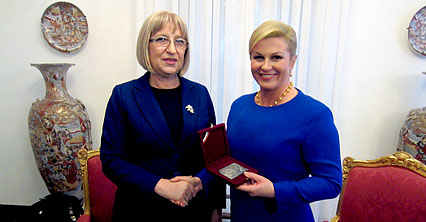
The first female President of Croatia took office on 15 February 2015. The inauguration ceremony was held in the capital of Croatia, at the Saint Marko Square in Zagreb, in the presence of many high ranking foreign guests. Among them the heads of state of Slovenia, Slovakia, Albania, Montenegro, Bosnia and Herzegovina, Macedonia, Hungary and Kosovo. 80 delegations from all over the world attended the ceremony.
Minutes before the inauguration, the Speaker of the National Assembly Tsetska Tsacheva gave a special interview for Croatia’s TV Channel 1. In her capacity as the first woman to preside over Bulgaria’s parliament, she was asked to comment on the role of women in politics. Kolinda Grabar-Kitarovic is the first woman to take the Office of President of Croatia. The Chair of Bulgaria’s parliament stressed that, in her view, the main positive features in the profile of a woman-politician were – diplomacy, flexibility and responsiveness, as well as the women’s ability to find solutions in difficult situations. She also mentioned that in critical situations women-politicians were perceived as guarantee to social rights and as defenders of the interests of citizens. In her words, in the voters’ minds, women-politicians bear human orientation and social responsibility. I congratulate the people of Croatia for choosing a woman for the President’s post, although this choice does not play down men, Tsetska Tsacheva said before the TV channel. Women and men in the 21st century are equal and have equal potential to be useful to their peoples, she added.
In Zagreb Tsetska Tsacheva has held a bilateral meeting with the newly elected President of Croatia. Before that she met with the Speaker of the parliament of Croatia, Yosip Leko. During the meeting it was confirmed that he was to visit Bulgaria as head of an official parliamentary delegation. The two heads of parliaments were firm that the bilateral relations were such of friendship, trust and partnership and were in perfect shape. They agreed that the two countries were having common goals – accession to the Schengen area, profiting of the advantages provided by the EU membership, stability and peace in the region, building of good infrastructure and developing of more intensive trade and economic cooperation.

- 22/04/2021
The Parliament imposed a moratorium on concessions, real estate deals and appointments pending the election of a new cabinet or caretaker government - 16/04/2021
By 156 votes “in favour”, the National Assembly accepted the resignation of the Council of Ministers with Prime Minister Boyko Borisov - 15/04/2021
Speech by Mrs. Iva Miteva upon her election as a President of the 45th National Assembly - 15/04/2021
The Member of Parliament Iva Miteva was elected President of the 45th National Assembly - 15/04/2021
The Members of the 45th National Assembly were officially sworn in - 03/03/2021
The President of the National Assembly Tsveta Karayancheva and MPs attended the solemn fireworks-retreat on the occasion of the Liberation of Bulgaria - 03/03/2021
Every Bulgarian should preserve and honour the memory of those glorious ancestors, thanks to whom Bulgaria exists today, said the President of the National Assembly Tsveta Karayancheva in Gabrovo - 03/03/2021
Today we are on Shipka to pay our respects to all the heroes who sacrificed their lives for freedom, said the President of the National Assembly Tsveta Karayancheva after climbing Shipka Peak together with young people from all over the country - 02/03/2021
The Vice-President of the National Assembly Valeri Simeonov received an award from the Bulgarian Republican Self-Government in Hungary - 26/02/2021
The Parliament adopted at second reading amendments to the Measures Against Money Laundering Act
 Български
Български English
English